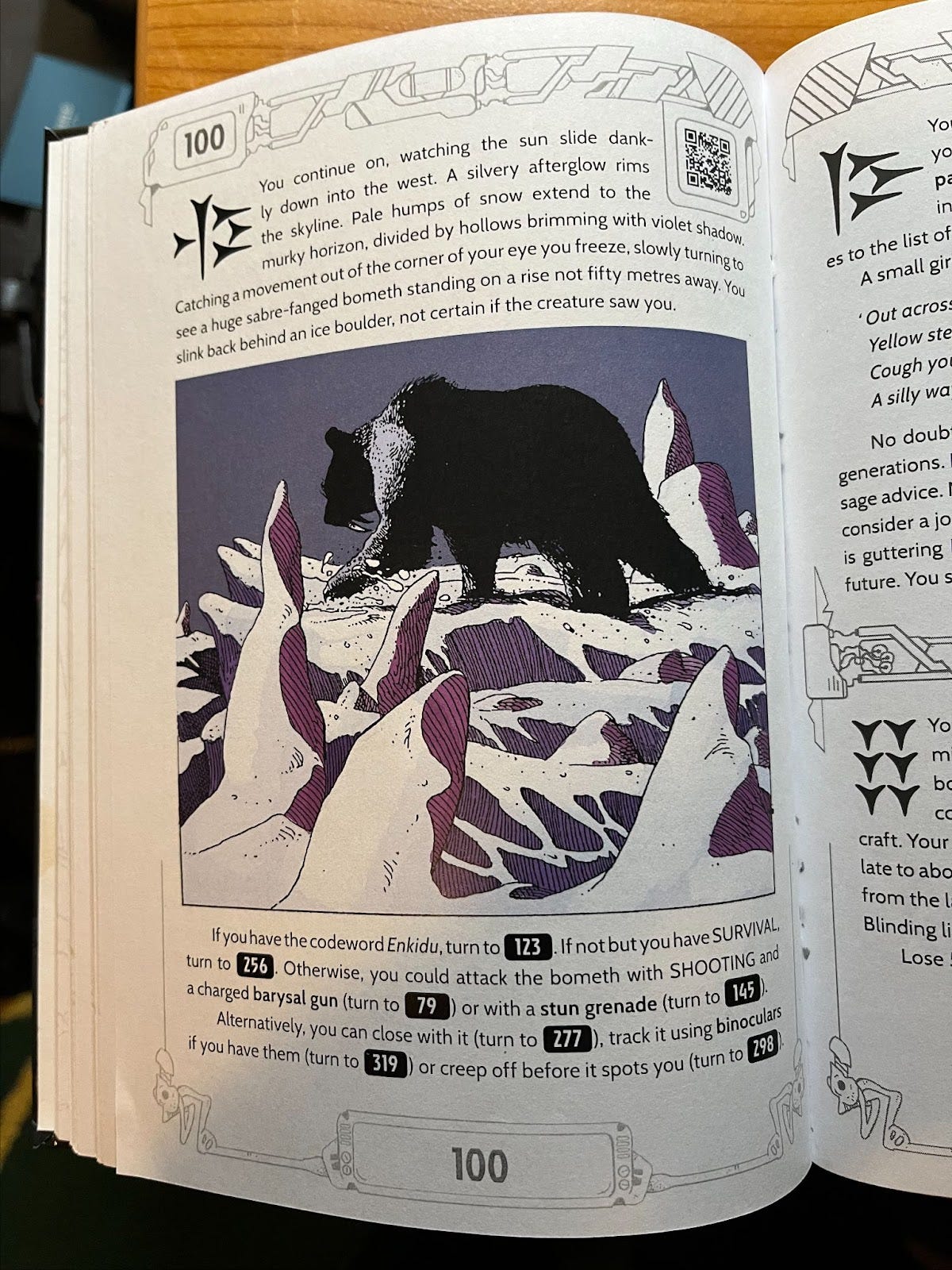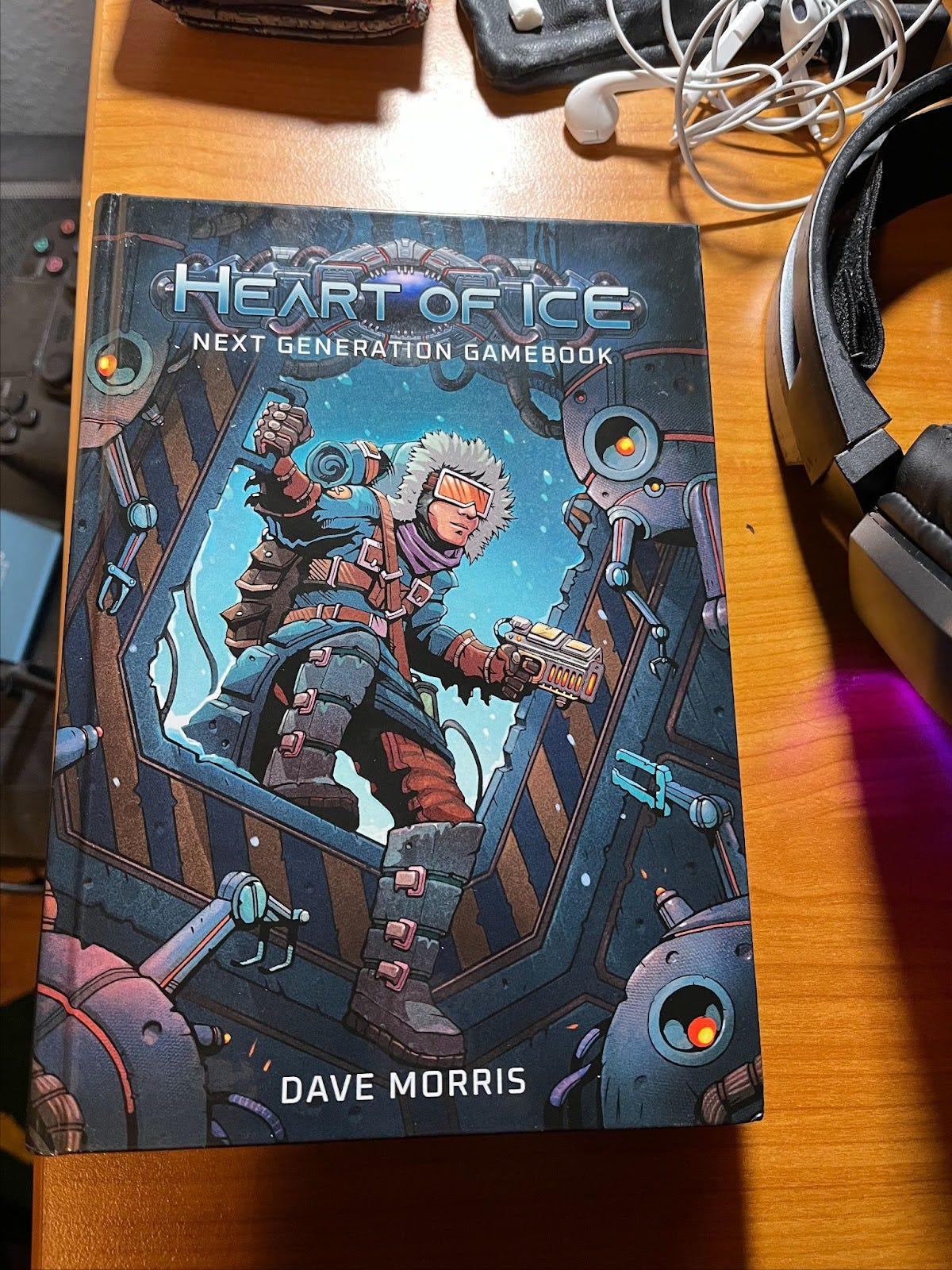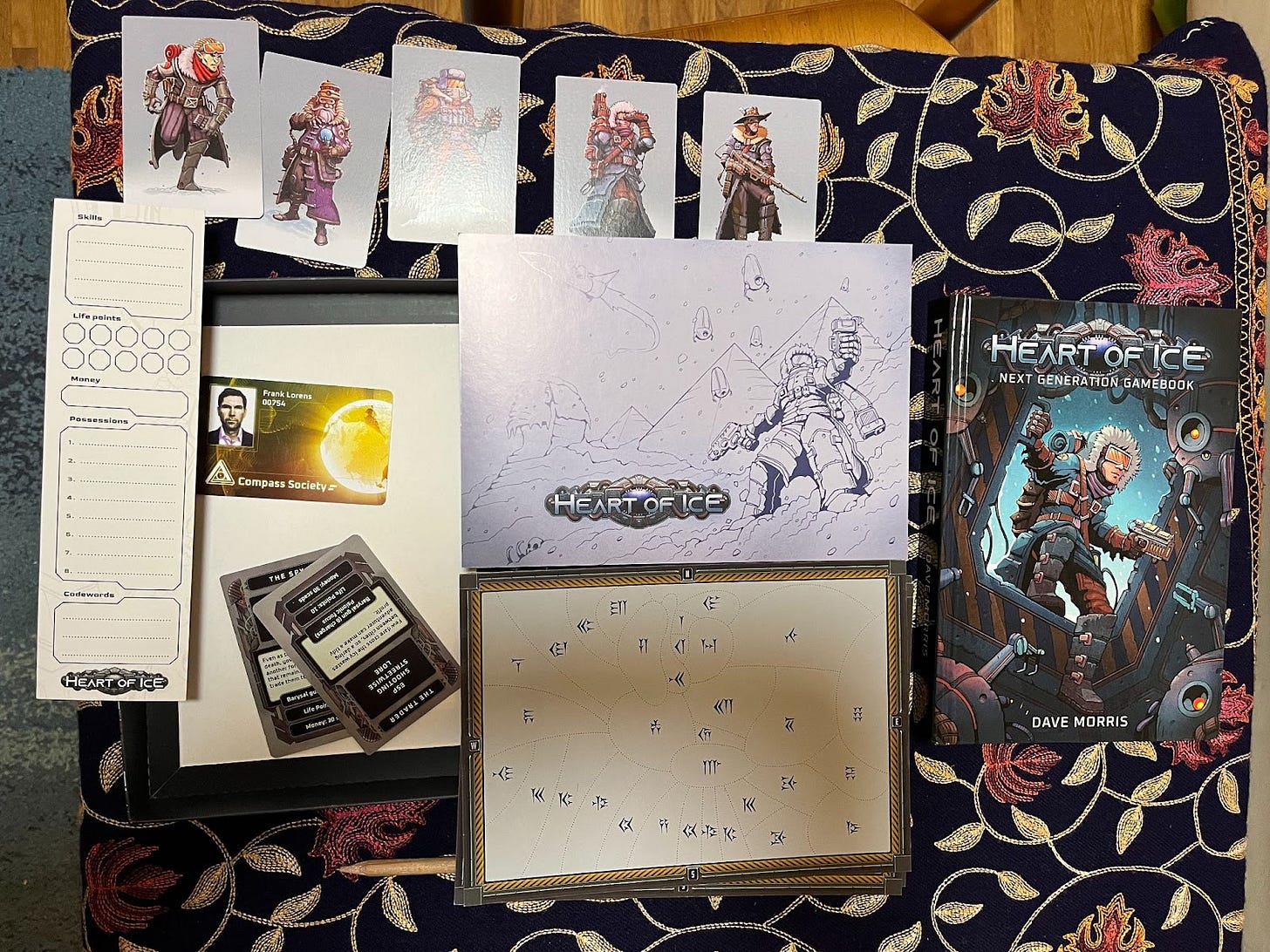Narrative Exploration Done Right: OSR Wisdom from Heart of Ice
#006 - Exploration, Tension, and Player Agency—Lessons from Heart of Ice
Year 23XX, somewhere in the frozen Sahara. I've been playing Heart of Ice for 1-2 hours, freezing to death in the barren landscape of an artificially created ice age. My character doesn't die because of an unfortunate dice roll, but because I seem to have made the wrong decisions despite careful and thoughtful exploration. Looks like I’ll have to try again ...
Unexpected Excitement While Enjoying a Gamebook
Heart of Ice is a classic solo gamebook, originally written in 1994 by gamebook legend Dave Morris. It took me about ten attempts to play through the story and reach a (very satisfying 😉) conclusion! I’m playing the (possibly out-of-print?) 2023 deluxe version from OtherWorlds, which comes with some fancy extras: a nicer layout, colored illustrations, scratch maps, character sheet bookmarks, an accompanying soundtrack, and more.
Let me quote Reddit user NightMachines’ excellently fitting review to show you what it is all about:
Heart of Ice … it really is that good :-O
[…]
It’s really well written and the sci-fi, post-apocalyptic, high-tech ice wasteland setting is fleshed out nicely. [...]
No dice! You get to choose four skills that work exactly like keywords, so if you have the “piloting” skill for example, you can drive vehicles and if not, you simply can’t and have to find another way to reach your goal. Interestingly, this game mechanic let’s you have a glimpse of what might be possible with other characters, because you obviously see what other skills, items or keywords can be chosen, so it motivated me to play again and again, just to find out what was behind those other choices.
There are also regular keywords, life points, money, items and basic inventory management too. It works super well and even just with the Scientist character I played most of the time, I encountered quite a number of different ways of getting to the finale.
[...]
I don’t really enjoy restarting those open world games [...] over and over again when I die in them [...]. In Heart of Ice however, it’s all your own decisions and due to the writing I felt like I could make those decisions more deliberately, without randomly stumbling into my death so frequently. I never had the urge to cheat in Heart of Ice, even when I died.
Setup is quick and all I need for a game is a pencil, an eraser and a single sheet of A5 paper. So it fits on those small airplane tables, or even just your knees comfortably. [...]
[...] It’s tense, it’s fun, it’s easy to get into, it tells a cool story and it offers a lot of actual replay value and a great feeling of discovery.
I couldn't agree more with this review! The story and atmosphere immediately grabbed me, making me want to uncover the mystery of this strangely displaced future.
Okay, So I Had Fun Playing a Gamebook — But Why Blog About It?!
Inspiration for How OSR Should Feel
As the usual GM for our OSR/NSR sessions, I rarely get to play from the player’s perspective — which is crucial for running better games. Solo games are relatively new to me, but they can teach valuable lessons about crafting and running OSR adventures that deliver excitement, tension, and meaningful player choice.
In Heart of Ice, you start with a premade or custom character. After an atmospheric intro, you navigate section by section in typical gamebook fashion, making choices based on found keywords, items, and skills — a narrative puzzle with multiple solutions. If you make poor decisions or lack key resources, you die and start over.

This taught me how to create OSR adventures that capture:
Exploration – The game’s starting location offers at least four different paths to the goal, which fan out further as you progress. You can travel toward Venis by ferry, through the steaming jungle of Lyonesse, past the Jib-and-Halter, across the Atlas Mountains, or even stumble upon a buried maglev tunnel to the Sahara — all before reaching the central mystery. Each section feels like uncovering a new part of a mysterious world. It’s a sandbox disguised as a gamebook.
Tension – I get through a buried tunnel to a new location in the icy desert. Fortunately, I have the right skill to notice the armed raiders in the next room. But the game immediately offers more options: escape, attack, sneak, or other variations depending on my skills. The world is dangerous, and mistakes have real, irreversible consequences. That’s tension without relying on dice.
Excitement – When I was later asked if I had a particular codeword or item I’d never heard of, I kept thinking: Where the hell was that?! The game showed me how many paths and hidden secrets existed — and I wanted to explore them all.
Heart of Ice dares to portray the world as consistently dangerous, unforgiving, and full of hidden content that even a successful playthrough might miss.
Doesn't that remind you of OSR?
Player agency – Decisions matter and shape the outcome of actions. I saw this most clearly when I confronted a massive spider-like machine guarding a corridor. I had the option to use Agility, Paradoxing, Cunning, or a grenade — all viable strategies depending on what I had chosen earlier. And retreating was valid too.
Multiple solutions – Many paths to success (and failure) without always only relying on dice rolls. There are at least three ways to reach the final location, and even more ways to interact with allies or rivals. One ending had me join a faction. In another, I was betrayed. In a third, I tricked someone out of a weapon I needed. None of it was random.
True exploration – The excitement of uncovering hidden content and in a living world, dripping with lore. I have blogged about how important lore is for immersion before.
Combat as war – Strategy and resources matter more than dice rolls. You don’t survive by fighting everything. In fact, smart use of skills, deception, or terrain is often the only viable option. That’s very “combat as war,” not “combat as sport.”
Experiencing these principles as a player makes me a better GM — it reinforces how to design and run OSR games that feel dangerous, rewarding, and meaningful. I’m not saying that these four are all there is to OSR, but I would at least describe them as being among the core elements.
And to top it off: at the campfire before the final descent, every NPC is pretending to work together — and you know someone is going to betray the rest. The game even lets you betray them. That’s agency.
For my beloved Pirate Borg, Dave Morris wrote another gamebook inspiration: Down Among The Dead Men. I might have to check that one out next, as well as solo TTRPGs.
What other gamebooks or solo games would you recommend? I’d love to hear your suggestions!
“From pebble to monolith—your journey matters. The Golems have spoken.”
Alexander from Golem Productions





I love heart of ice for exactly these reasons. You might be interested in Morris' fabled lands series as an open world gamebook a la elder scrolls.